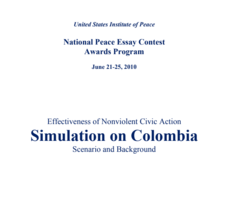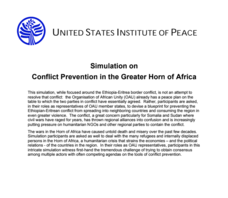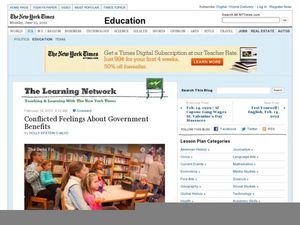New York State Education Department
US History and Government Examination: January 2017
Looking for a resource that tests both US History and government? Here's a test that serves as a great way to test comprehension of complex concepts by using a variety of question formats and covering a wide array of topics. The...
iCivics
Governing Communities
The government at the local level acts as perhaps one of the most relevant government systems to many in their communities. Learners discover how the local government shapes their lives and the similarities and differences between the...
iCivics
Step Three: Who You Gonna Call?
Problem solving is an essential skill everyone must master. The resource instructs pupils how to analyze different scenarios and decide the best way to solve many different problems that take place in communities. Scholars read, discuss,...
US Institute of Peace
Effectiveness of Nonviolent Civic Action Simulation on Colombia
With new leadership comes new hope! After years of violence, the people of Colombia elect a new president ... could this mean an end to conflict? Civics scholars take part in a large group role-playing exercise designed to illustrate the...
US Institute of Peace
Simulation on Conflict Prevention in the Greater Horn of Africa
Is containing a conflict possible in the Horn of Africa? Young peacekeepers engage in a simulation that examines the multi-faceted conflict that exists between the countries of Ethiopia and Eritrea. Representatives from ten countries in...
US Institute of Peace
Organizations Working for Peace
We're all in this together! Show young scholars that peace is a process and having the support of like-minded people can make it happen. 13th in a series of 15 peace building activities, groups conduct research on a peace organization,...
US Institute of Peace
Perspectives on Peace
Is peace simply the absence of war, or is there more to the story? Young social scientists define peace in the second installment of a 15-part series. Groups work together to explore cultural concepts of peace and the peacemaking process...
US Institute of Peace
Governance, Corruption and Conflict Simulation on Nepal
Can your class help the people of Nepal? Scholars take an in-depth look into the social injustices and struggling economy of a country in turmoil during a multi-day role-playing exercise. After reviewing information on the problems...
US Institute of Peace
Simulation on The Case of “Palmyra”
War-torn Palmyra needs your help! Young negotiators play the part of citizens of opposing countries through an eye-opening simulation. The fictional countries of Siwa and Nizwa stand at the brink of war, and your class' job is to create...
Jeopardy Labs
Third Grade Social Studies Review
In this interactive JeopardyLab game, with the assistance of a teacher, students can play against each other or in teams to review the content of Third Grade Social Studies. Allow the first team to choose a topic and a point value for a...
Learning to Give
Why Volunteer?
Inspire scholars to volunteer their time to make a positive change in their community. With help from research, a public speaker, and reflection, learners define and asses what it takes to be a volunteer in a business, non-profit,...
National Park Service
Help Lincoln Get to the White House
Though Abraham Lincoln rose to prominence in the White House, he began his life in an Indiana log cabin. Young Lincoln historians discover notable facts about the sixteenth president of the United States in a timeline interactive that...
Youth Outreach
Connecting the Separate Powers
Scholars demonstrate what they know about the separation of powers through role play. Two individuals act out a skit as the remaining class members discuss and decide whether the interaction they observed is an appropriate example of the...
Kids Voting USA
Kids Voting USA: K-2 Classroom Activities
Address both social studies and critical reading skills with a resource dedicated to the voting process, the American democracy, and the ability to evaluate information in order to develop a stance on an issue. Each themed activity set...
Alabama Department of Archives and History
Alabama's 1901 Constitution: What Was at Stake?
Who should be able to vote? As part of a study of the 1901 Alabama Constitution, class members examine primary source document that reveal the reasons the authors gave to support their positions on this question and their assumptions in...
Alabama Department of Archives and History
Alabama's 1901 Constitution
"We, the People of the State of Alabama. . ." Did you know that the Alabama State Constitution has 357,157 words while the US Constitution has only 4,400? And that it has 798 amendments while the US Constitution has 27? Class groups...
EduGAINs
Governmental Apology for the Aboriginal Experience—Canadian and World Studies
What constitutes an effective apology? After considering a series of scenarios, class members develop criteria for an effective apology and then use these indicators to evaluate Canada's Prime Minister Harper's apology to former...
Federal Reserve Bank
Choices Are Everywhere: Why Can’t We Just Have It All?
Here is a resource covering a range of terms and concepts regarding scarcity, opportunity cost, and government debt in economics.
Curated OER
Understanding the Debt Ceiling Debate and the Budget Control Act of 2011
Upper graders listen to a podcast on the EconTalk website featuring economist Keith Hennessey. The podcast focuses on the Budget Control Act of 2011, the national debt, and government spending. They read specifics about the BCA, then...
Curated OER
Conflicted Feelings About Government Benefits
Government spending on social programs in the US is a big topic. It is also the current event kids will read about as they delve into this issue of the New York Times. They'll read the article, then answer seven comprehension questions....
Curated OER
Chapter 11: Aggregate Demand and Aggregate Supply
Bring the intricacies of the Aggregate Demand-Aggregate Supply Model (AD-AS) to life in this detailed - yet understandable - presentation. Viewers will appreciate the clear explanations and graphs as they begin their adventure through...
Curated OER
Emerging Democracies in Eastern Europe and Russia: How Are They Doing?
Students consider the success of democracies in Eastern Europe. In this government systems lesson plan, students research the implementation of democratic practices and rule in the countries of Eastern Europe following the Cold War....
Curated OER
Outsourcing City Hall
Students examine how some city halls around the country are using private companies to run them. After watching a video, they write a reaction paper to some part of it. They write an article for their school newspaper discussing whether...
Curated OER
Governance- Grade 9
Ninth graders participate in talking circles about how their classroom will function. In this self-governance lesson, 9th graders participate in talking circle activities to create rules that will govern their class. Students compare...

























